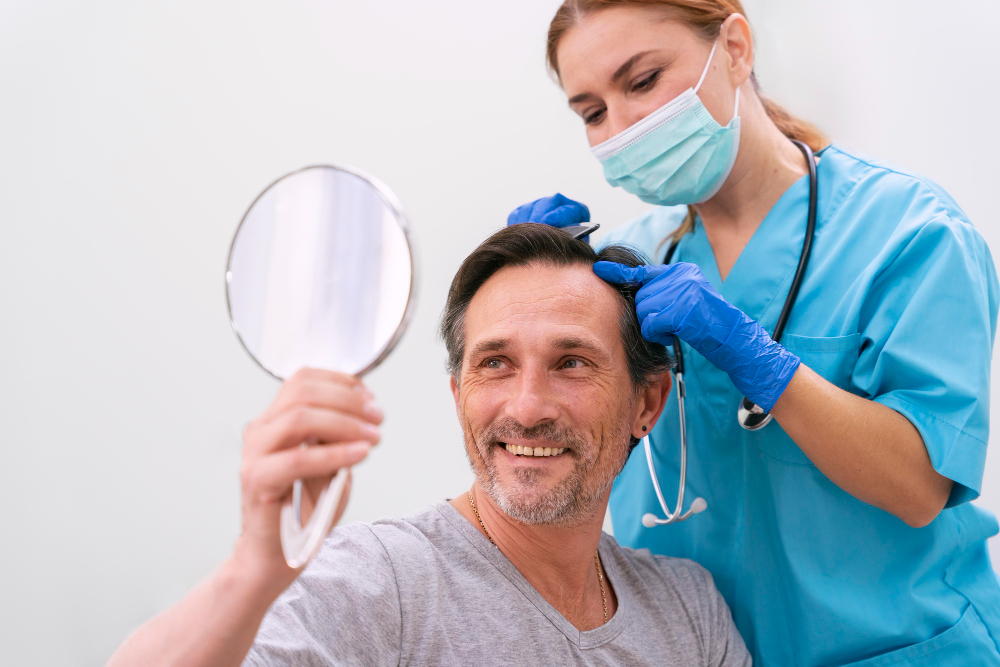Hair health plays a significant role in our overall appearance and confidence. For many people, hair transplantation has become a vital solution for restoring hair and regaining self-assurance. The significance of maintaining healthy hair cannot be overstated, as it directly impacts how we present ourselves to the world. In this blog, we will delve into the importance of hair health and explore the transformative role of transplantation in enhancing both physical appearance and emotional well-being. So, let’s embark on this journey to discover the power of healthy, luscious locks!
Understanding Hair Health
Hair health is influenced by a variety of factors, including diet, lifestyle, genetics, and environmental influences. These elements can significantly impact the condition of your hair. For instance, a balanced diet rich in essential nutrients such as vitamins, proteins, and minerals can promote healthy hair growth and overall hair health. Additionally, lifestyle factors like stress levels and physical activity can also play a role in the condition of your hair.
Regular care routines are crucial for maintaining optimal hair health. This includes washing your hair with suitable products, conditioning to keep it moisturized and manageable, and protecting it from damage caused by heat styling or environmental factors.
Common Hair Issues
Hair loss, thinning, and scalp conditions are common issues that many individuals face. These problems can have a significant impact on one’s self-esteem and quality of life. Understanding the causes of these issues is essential for finding effective solutions.
Hair loss can be attributed to various factors such as genetics, hormonal changes, medical conditions, or certain medications. Thinning hair is often associated with ageing but can also be influenced by lifestyle choices and underlying health issues. Scalp conditions like dandruff or scalp psoriasis can cause discomfort and affect the appearance of your hair.
By addressing these common hair issues comprehensively, individuals can gain valuable insights into potential treatment options and preventive measures to maintain healthy hair.
Hair Transplantation: What You Need to Know
Hair transplantation is a surgical procedure that involves moving hair follicles from one part of the body (the donor site) to a bald or balding part of the body (the recipient site). The most common areas for transplantation include the scalp, eyebrows, and beard. The process aims to restore hair in areas where it has thinned or receded.
There are two primary methods of hair transplantation: Follicular Unit Extraction (FUE) and Follicular Unit Transplantation (FUT).
FUE involves individually extracting follicular units from the donor area using a punch tool and then transplanting them into the recipient area. This method leaves minimal scarring and allows for quicker healing.
On the other hand, FUT involves removing a strip of tissue from the donor area, dissecting it into individual follicular units, and then implanting them into the recipient area. While FUT may result in a linear scar at the donor site, it can be an effective option for those who require a large number of grafts.
When considering these methods, it’s essential to visit turkey hair transplant weigh their pros and cons based on your specific needs and expectations. Consulting with a specialist will help you determine which approach is best suited for you.
Preparing for a Hair Transplant
Before undergoing a hair transplant procedure, there are several steps you should take to prepare yourself both physically and mentally. It all starts with scheduling a consultation with a qualified specialist who can assess your candidacy for the procedure.
During the consultation process, you can expect the specialist to evaluate your current hair loss pattern, discuss your medical history, and address any concerns or questions you may have. This is also an opportunity for you to gain insight into what to expect during and after the surgery.
It’s crucial to follow any pre-operative instructions provided by your specialist, which may include guidelines on medications, alcohol consumption, smoking cessation, and dietary restrictions. By adhering to these recommendations, you can optimize your chances of achieving successful results from your transplant.
Post-transplant Care
After undergoing a hair transplant procedure, proper post-operative care is essential for promoting healthy regrowth and ensuring long-term success. Your specialist will provide detailed instructions on how to care for the transplanted area in the days and weeks following the surgery.
This may involve gentle cleansing of the recipient area, avoiding exposure to direct sunlight or harsh chemicals, refraining from strenuous activities that could disrupt healing, and adhering to any prescribed medications or topical treatments.
In addition to following these guidelines, maintaining overall hair health is key in supporting successful outcomes from your transplant. This includes adopting a balanced diet rich in essential nutrients like protein and vitamins known to promote hair growth.
By taking proactive steps before and after your hair transplant procedure, you can maximize its effectiveness while safeguarding against potential complications.
Conclusion
Hair transplantation offers hope for individuals seeking solutions for their hair loss concerns. By educating yourself on the process involved as well as pre- and post-transplant care strategies, you can approach this journey with confidence.
If you’re considering hair transplantation as an option for addressing your own hair loss concerns,
turkey hair transplant
Also, visit featurestic.com for more quality information.

